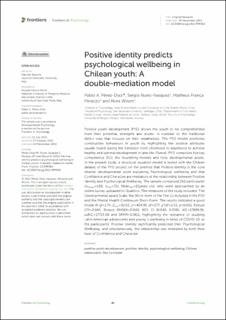| dc.description.abstract | Positive youth development (PYD) allows the youth to be comprehended from their potential, strengths and assets, in contrast to the traditional deficit view that focuses on their weaknesses. The PYD model promotes constructive behaviours in youth by highlighting the positive attributes usually found during the transition from childhood to adulthood to achieve healthy and optimal development in later life. Overall, PYD comprises five key competence (5C), the flourishing models and forty developmental assets. In the present study, a structural equation model is tested with the Chilean dataset of the PYD project on the premise that Positive Identity is the core internal developmental asset explaining Psychological wellbeing and that Confidence and Character are mediators of the relationship between Positive Identity and Psychological Wellbeing. The sample comprised 261 participants (nWomen = 189, nMen = 72), MeanAge = 22 years old, who were approached by an online survey uploaded to Qualtrics. The measures of the study included: The Developmental assets Scale, the Short-form of the Five Cs included in the PYD and the Mental Health Continuum Short-Form. The results indicated a good model fit (β = 1.74, Ztotal = 10.63, χ2 = 424.95, df = 277, χ2/df = 1.53, p < 0.001, Robust CFI = 0.945, Robust RMSEA = 0.049, 90% CI (0.040, 0.058), AIC = 17689.91, saBIC = 17719.08 and SRMR = 0.061), highlighting the relevance of studying Latin-American adolescents and young ‘s wellbeing in times of COVID-19, as the participants’ Positive Identity significantly predicted their Psychological Wellbeing, and simultaneously, this relationship was mediated by both their level of Confidence and Character. | en_US |

